when do you start quarantine after exposure
You can be released on day 11 as long as you have never had symptoms. When to start and end quarantine You should stay home for 14 days after your last contact with a person who has COVID-19.
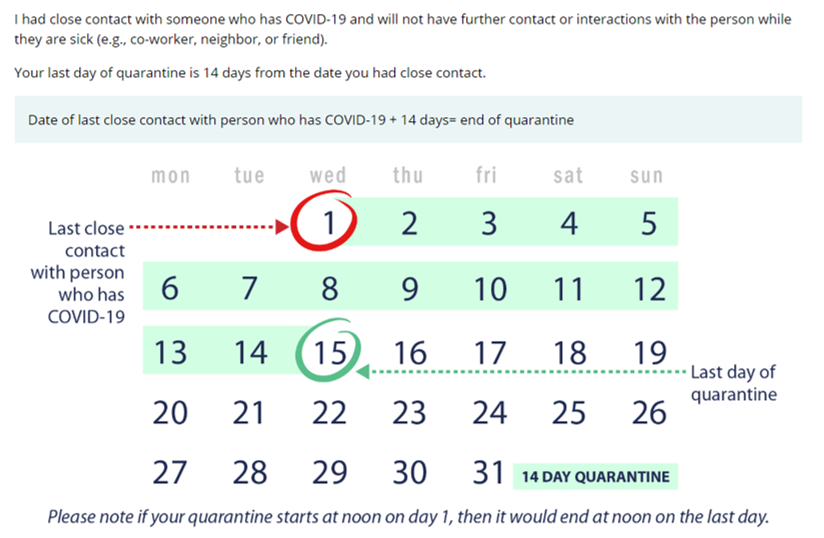
Novel Coronavirus Disease Covid 19 Information Student Health And Wellness
If you develop symptoms at any time in the 14 days after exposure self-isolate immediately and.
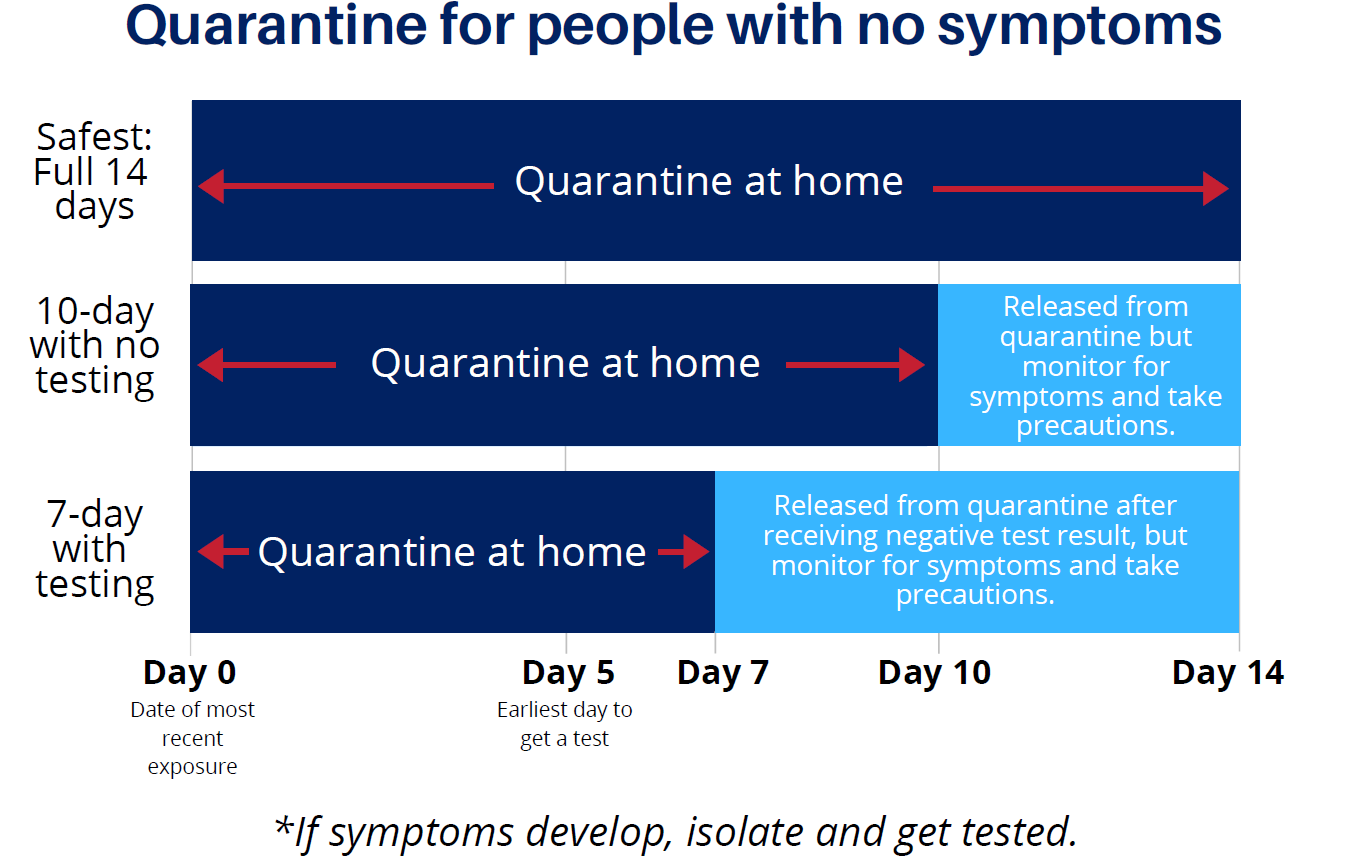
. Evidence supports ending isolation and precautions for people with COVID-19 using a symptom-based strategy. Healthcare professionals find information and recommendations for ending isolation and precautions when caring for people with laboratory-confirmed COVID-19 including children and adults people who are severely ill and people who are infected but never develop symptoms. It can take almost a week after exposure to COVID-19 to have a positive test result.
I am not vaccinated. If you recently completed isolation and someone in your household tests positive for the virus that causes COVID-19 shortly after the end of your isolation period you do not have to quarantine or get tested as long as you do not develop new symptoms. However according to CDC guidelines you may discontinue quarantine after a minimum of 10 days if you do not have any symptoms or after a minimum of seven days if you have a negative COVID test within 48 hours of when you plan to end quarantine.
Unvaccinated employees and students can leave quarantine after 10 days including returning to work and to in-person class following your most recent exposure provided you do not develop symptoms of COVID-19. Check for fever or respiratory symptoms. This is called quarantine.
If you have been in close contact with someone diagnosed with COVID-19 and are not having any symptoms you will quarantine for 10 days after the date you came in contact with the positive person. You must continue this self-monitoring for a full 14 days from the date of your possible exposure to the virus even after your 10-day quarantine has ended. If testing is not available quarantine for 10 days after your exposure to COVID-19.
Stay home and limit interactions with others until 10 days after exposure no symptoms and without testing OR until 7 days after exposure no symptoms and with a negative test result occurring between days 5 and 7. Regardless of which quarantine option you choose. For all of the following scenarios even if you test negative for COVID-19 or feel healthy you should stay home quarantine because symptoms may appear 2 to 14 days after exposure to the virus.
If you develop any symptoms or your test result is positive immediately self-isolate for 10 days from the onset of symptoms and get tested if you havent yet. If you do not develop any symptoms you may end quarantine after 10 days from the date of your last close contact with someone with COVID-19 unless you received other instructions from your health department. At that point if your symptoms have improved and youve been without a fever for at least 24 hours it should be safe.
If you already had and recovered from COVID-19 within 3 months of the exposure you might not have to quarantine. You have tested positive for COVID-19 within the past 3 months and recovered as long as you do not develop new symptoms. This guidance is not applicable to individuals who are fully vaccinated ie 2 weeks after series completion or have a positive antibody test within the past 90 days and remain without symptoms.
Thats because the risk of re. Your last day of quarantine should be 7-14 days from the day of your last contact with the person with COVID-19. Test again 5-7 days post-exposure see below.
You DO NOT need to quarantine after exposure to someone with COVID-19 if. If youve been vaccinated the best time to get tested is three to five days after an exposure. If you have beenfully vaccinated and it has beenat least 14 days since your last dose of a two-dosevaccine or 14 days since a one-dose vaccine you do not need toquarantine.
When to start and end quarantine You should stay home for 14 days after your last contactwith a person who has COVID-19. If you develop symptoms. Symptomatic regardless of exposure Self-isolate.
You will need to continue to quarantine for 14 days after the person meets criteria to end home isolation as recommended by the CDC unless otherwise specified. Coronavirus symptoms start about five days after exposure Johns Hopkins study finds The median incubation period of COVID-19 from exposure to the onset of symptoms is 51 days researchers say meaning the recommended 14-day quarantine period is a reasonable amount of time to monitor individuals for development of the disease. You have been fully vaccinated against COVID-19 within the last 3 months and show no symptoms.
Always watch for symptoms for a full 14 days after exposure Ideally quarantine in a separate room if feasible Facilities may elect to quarantine newly admitted residents and residents returning after hospital or ED visit discharge. If you are fully vaccinated dont get tested until three to five days after your exposure even if you dont have symptoms. If you are unable to avoid close contact you must stay in quarantine until 7-14 days from.
If I was exposed to someone with COVID-19 and I DO NOT have symptoms how long should I quarantine. Quarantine after 10 days on day 11 after exposure may be acceptable if. The vast majority of people who are going to get.
Stay home until you can get tested and keep staying home until you get your test results back. If you do not get tested for COVID the CDC says that. Henry Winkelhake Posted.
Symptom startExposure to COVID-19 Isolation period Leave isolationquarantine. If you do start to develop symptoms you should isolate for at least 10 days. When the pandemic first started you needed to quarantine yourself for 14 days if you were exposed to someone with COVID-19.
If you continue close contact with the person do not start counting your 7-14 days until your last day of contact with the infected person. Please note for all of these. The WDH recommends that you wear a maskfor 14 days following your exposure or until youve.
If you arent fully vaccinated quarantine right away. Esta publicación también está disponible en español. Once all members of the household have completed isolation or quarantine refer to the guidance below for new exposures to COVID-19.
More recently the CDC adjusted that a little bit and theyre saying somewhere in that seven- to 10-day range. Watch for symptoms until. If you cant find someplace else to live which is completely reasonable thats hard to do then basically your quarantine starts on the day that you knew the person was positive in the best case scenario that extends for 14 days.
If you develop even mild symptoms or a temperature of 100F or higher you must immediately self-isolate and. Regardless of symptoms you should stay in quarantine if you were exposed within 6 feet for 15 minutes or more in a 24-hour period to a person who tested positive for COVID-19. If you live in a household where you cannot avoid close contact with the person who has COVID-19 you should quarantine immediately.
See page 5 for quarantine after. However as of July. If you are fully vaccinated you should wait.
You must monitor yourself for symptoms wear a mask at all times around others wash hands and stay at least 6 feet from others for 14 days after exposure. In some situations this time period may be shorter. AND o You continue to self-monitor for symptoms until 14 days after the last exposure.
Some places in the United States and other countries ask travelers to quarantine for 14. O You do not develop symptoms of COVID-19 at any point during quarantine. The CDC recommends that you get tested three to five days after exposure even if you do not have any symptoms.
Fully vaccinated residents do not need to quarantine if no close contact exposure or travel in the past 14 days. You should also wear a face mask indoors for 14 days or until you get a negative COVID test result. If you are fully vaccinated and have been around someone with or suspected of having COVID-19 you do not need to quarantine.
If you are not fully vaccinated and have been exposed to someone with COVID-19 you should quarantine yourself immediately for 10 days.
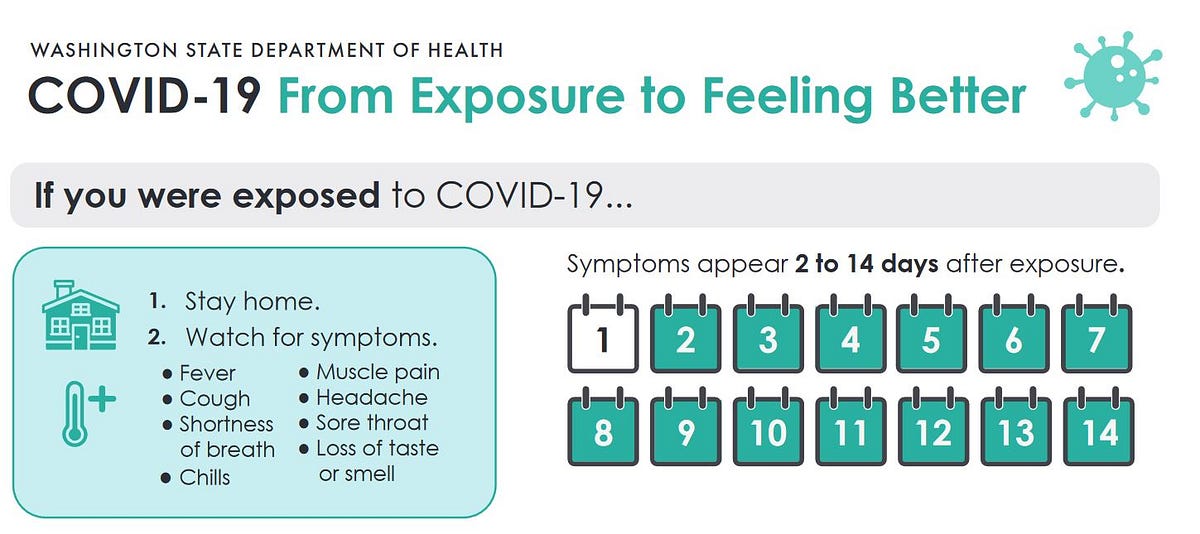
From Exposure To Feeling Better Let S Go Over What Happens If You Were By Washington State Department Of Health Public Health Connection Medium

Quarantine Isolation What Do I Need To Know
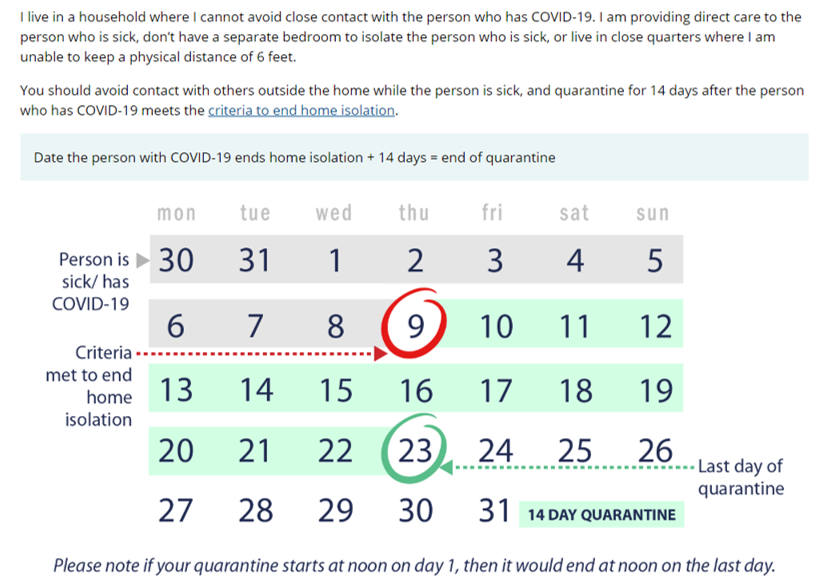
Novel Coronavirus Disease Covid 19 Information Student Health And Wellness
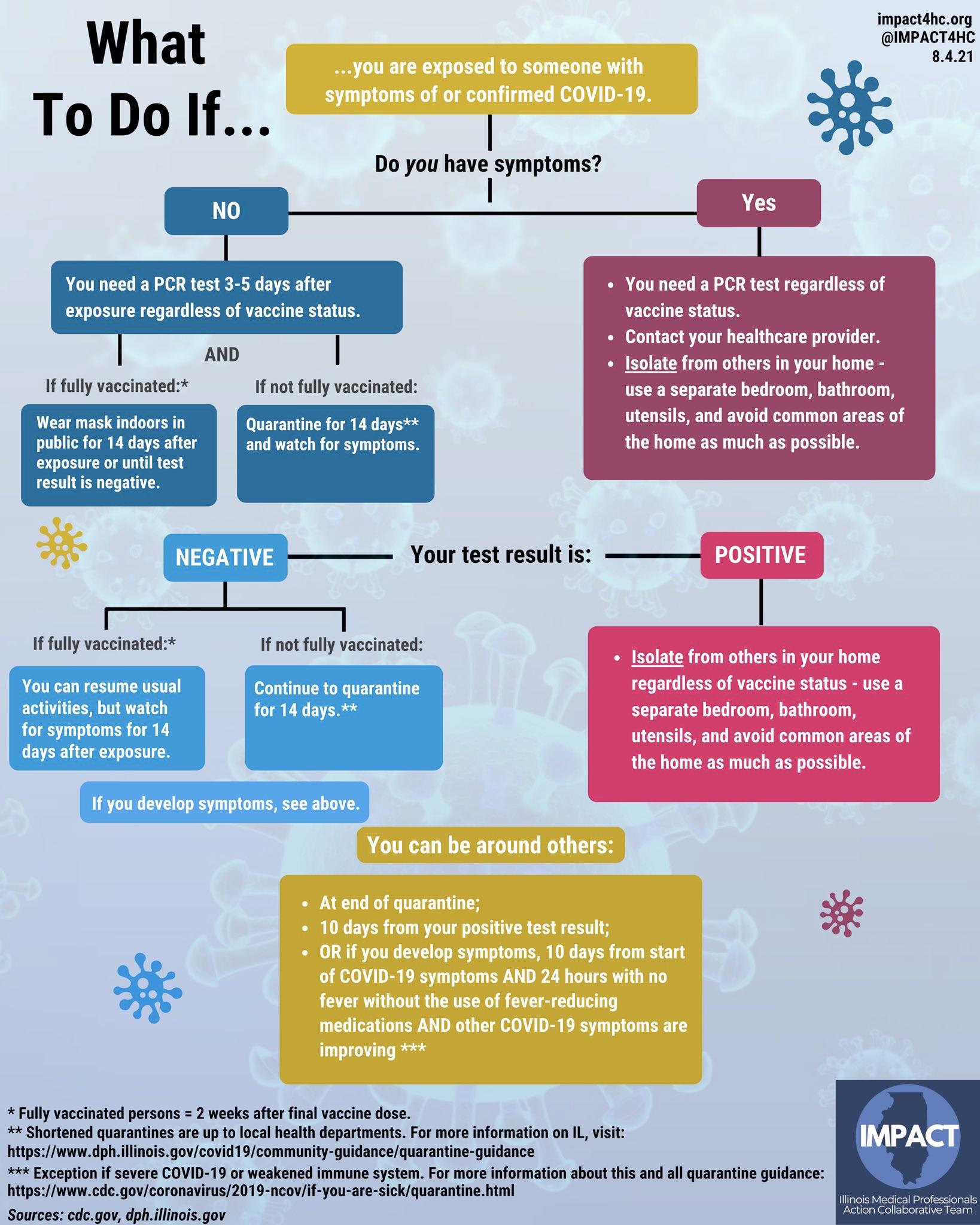
What To Do If You Are Exposed To Someone With Symptoms Of Or Confirmed Covid 19 Dear Pandemic
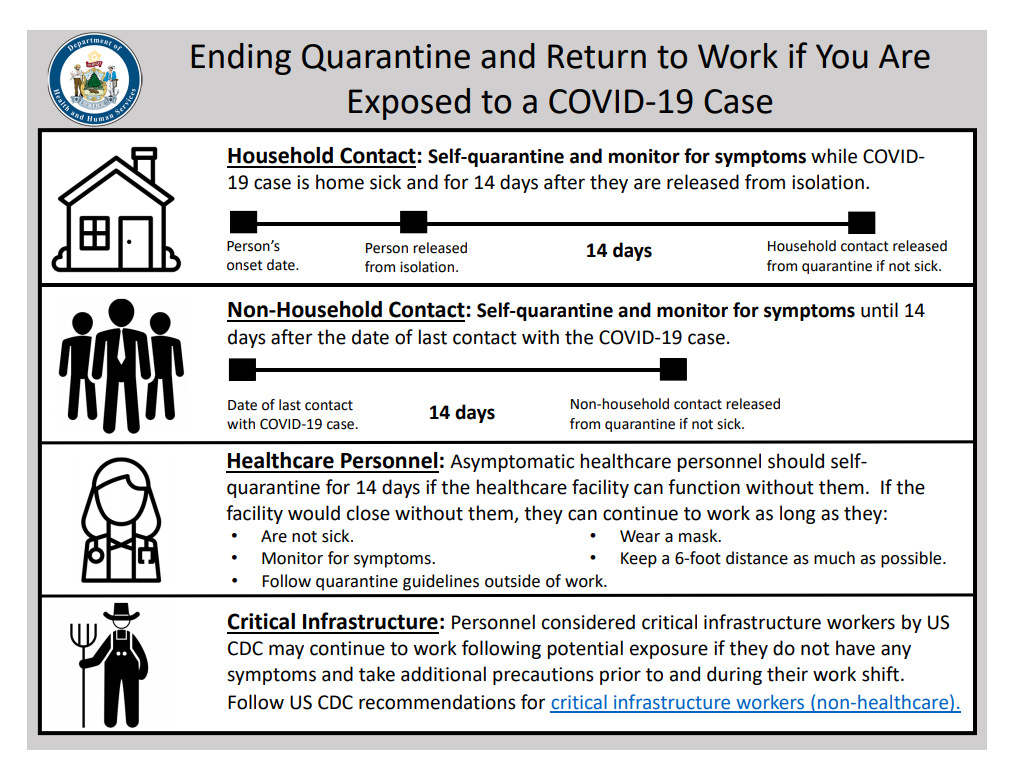
Covid 19 General Information Coronavirus Disease 2019 Covid 19 Airborne Disease Surveillance Epidemiology Program Mecdc Maine Dhhs

What To Do If You Do Not Have Symptoms Of Covid 19 But Have Been Exposed Medical Services University Of Colorado Boulder

Isolation And Quarantine For Covid 19 San Francisco Department Of Public Health

Important Covid 19 Exposure And Testing Information Preston Ridge Pediatrics

Here S Why It S Crucial To Quarantine For 14 Days After Covid 19 Exposure 8news

Frequently Asked Questions Covid 19 Quarantine

Quarantine And Isolation Infectious Diseases And Vaccinations Thl
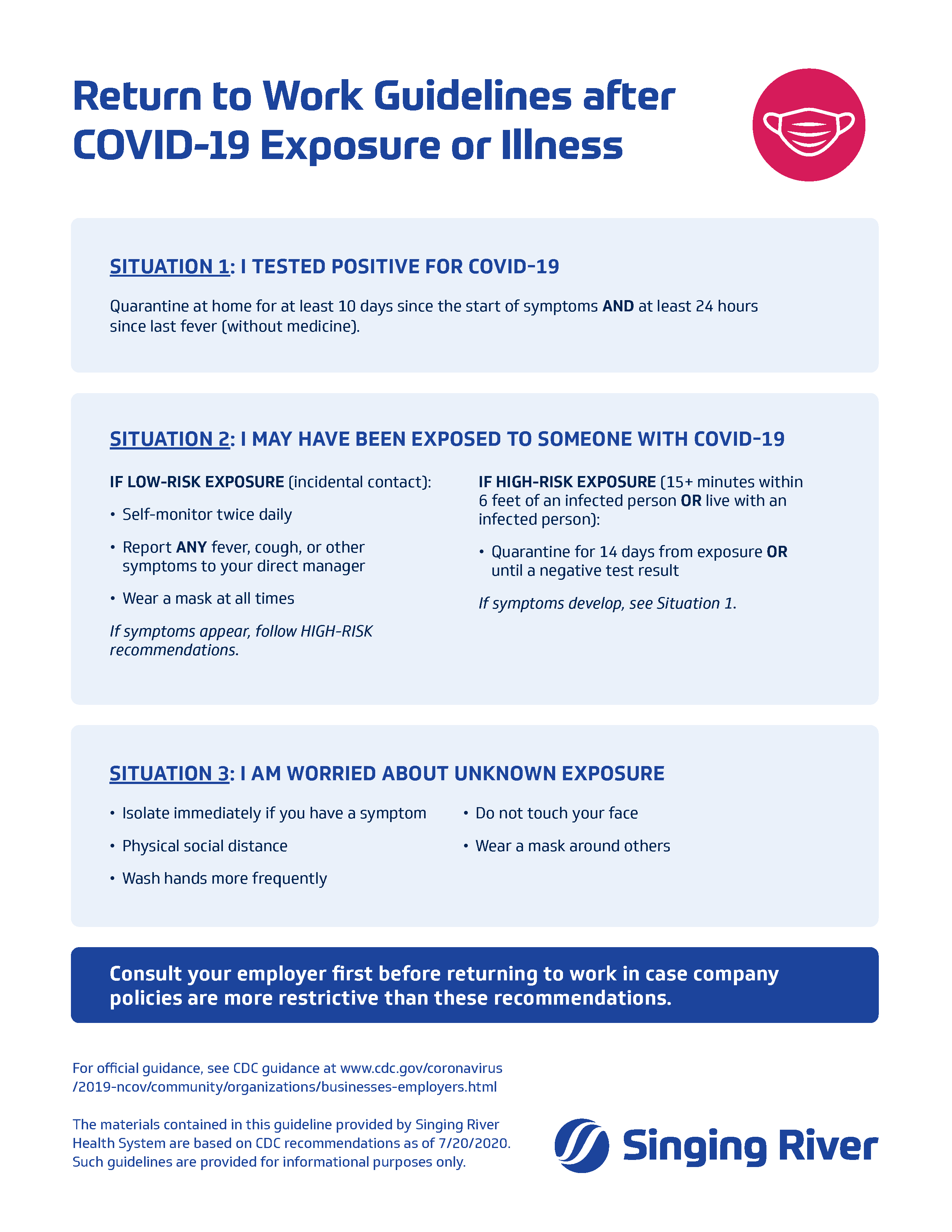
Return To Work Guidelines After Covid 19 Exposure Or Illness Singing River Health System

Explaining What Covid Exposure Means In Schools Pomeroy Daily Sentinel
Quarantine And Isolation Springfield Mo Official Website

Coronavirus News Us Hospitalizations Exceed 100k For First Time Abc7 New York

Isolation And Quarantine For Covid 19 San Francisco Department Of Public Health
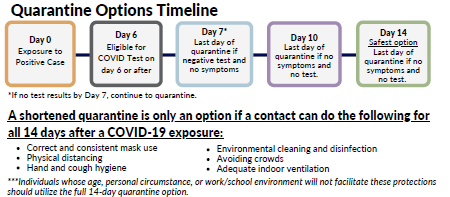
0 Response to "when do you start quarantine after exposure"
Post a Comment